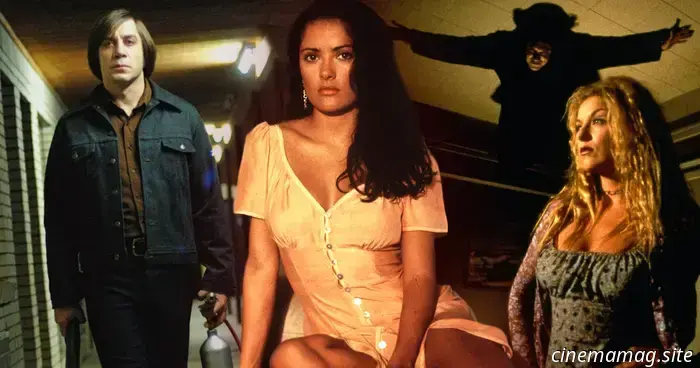
Cannes Review: Peak Everything is a romantic dramedy that uncovers humor amidst the anxieties associated with societal issues.
Although it's a common refrain that each generation believes they are witnessing the world's end, the swirl of anxieties—both everyday and global—present in today's era is especially troubling, and for many, overwhelming to grasp. Anne Émond’s Peak Everything, taking its title from the scientific idea that humanity is reaching peak levels of resource exploitation on Earth, distills widespread, apocalyptic worries into an intimate romantic dramedy centered on one man's quest for happiness and purpose in the face of looming climate catastrophes. While this charming and observant Canadian film is well-intentioned, it exhibits an exaggerated whimsy that somewhat detracts from its combination of romance, comedy, and significant real-world issues.
Though Adam (Patrick Hivon, who captures the role with an appropriate nervousness) presents himself as a likable, albeit sad figure, there is a profound turmoil within him. While his modest kennel business and the dogs provide some distraction, a deep-seated depression persists, impervious to running or meditation. The enthusiastic, uninhibited romantic gestures from Romy (Élizabeth Mageren), his only employee, confuse him more than they fulfill him. With little support from his cynical, all-knowing father Eugène (Gilles Renaud) and his disengaged, lackadaisical brother Frank (Éric Kamala Boulianne), Adam is desperate for solutions to uplift his spirits. He decides to purchase a therapy lamp and contacts a support line to address his troubled mental state. When the friendly Tina (Piper Perabo) answers, despite clarifying that the line is purely for technical assistance (much to his embarrassment), a connection is forged. After one setback, Adam embarks on an adventure to seek meaning in his chaotic life.
Warmly filmed on 35mm by Olivier Gossot and energetically edited by Anita Roth (The Beast), Peak Everything flows smoothly, which also indicates some of its shortcomings. As Adam confronts the stark reality of humanity entrenched in a self-created, unbreakable system, he even unsettles his therapist with his assertion of the absence of alternatives (nicknamed T.I.N.A., coincidentally the same name as the new woman in his life, among other quirky choices). While one doesn't anticipate a sense of dread akin to Melancholia from this premise, Émond's approach often feels too light, bordering on ephemeral. It’s an admirable attempt to juxtapose a rom-com against existential worries; through her cast, Émond conveys a fair amount of empathy and offers astute insights into humanity's disregard for the planet. However, there’s a misdirected frenetic energy that heavily leans on clichés for feel-good moments, exemplified by a slow-motion scene of Adam and Tina running through the streets, with a dozen dogs in tow, after engaging in a relatively safe act of anarchy. While such familiarity isn’t inherently problematic, this clash between serious themes and an uplifting tone rarely achieves the desired equilibrium.
As we delve deeper into Tina’s character—who initially seems too perfect for Adam—the film attains a necessary depth. As layers of her previously concealed home life come to light, a sense of sadness surfaces beneath her cheerful exterior. She remarks, “When you choose a path, you don’t get to see the other ones,” lending significance to what could have been seen as random actions. While Peak Everything alludes to a broader depiction of a decaying world, it primarily focuses on the experiences of its protagonist, cherishing the fleeting moments of joy when they arise. This limited perspective may frustrate some viewers, particularly regarding the extent of their empathy for Adam’s encompassing preoccupations. Concluding with a moment of physical release, Émond simplifies Adam’s struggle with depression, opting for the crowd-pleasing route that was hinted at with a lighthearted tone.
Peak Everything made its debut at the 2025 Cannes Film Festival.
Other articles
 Pennywise makes a comeback in the trailer for IT: Welcome to Derry.
HBO has delved into the stand-pipe and unveiled the initial teaser trailer for IT: Welcome to Derry. This nine-episode series has been crafted for television by Andy Muschietti and Barbara Muschietti, the pair responsible for the blockbuster film adaptation of Stephen King’s IT, who have brought this new horror to life alongside Jason Fuchs.
Pennywise makes a comeback in the trailer for IT: Welcome to Derry.
HBO has delved into the stand-pipe and unveiled the initial teaser trailer for IT: Welcome to Derry. This nine-episode series has been crafted for television by Andy Muschietti and Barbara Muschietti, the pair responsible for the blockbuster film adaptation of Stephen King’s IT, who have brought this new horror to life alongside Jason Fuchs.
 In what ways can remarkable movie characters inspire us to embrace risk-taking? - MovieMaker Magazine
Discover how iconic movie characters inspire us to take chances, make transformative choices, and embrace bravery.
In what ways can remarkable movie characters inspire us to embrace risk-taking? - MovieMaker Magazine
Discover how iconic movie characters inspire us to take chances, make transformative choices, and embrace bravery.
 Jurassic World Rebirth has released its final trailer.
Universal Pictures has released the final trailer for the upcoming installment in the Jurassic World series, titled Jurassic World Rebirth. Directed by Gareth Edwards, this action-adventure film takes place five years after the events of Dominion and centers around a proficient extraction team that is dispatched to an island populated by various dinosaur species, which they […]
Jurassic World Rebirth has released its final trailer.
Universal Pictures has released the final trailer for the upcoming installment in the Jurassic World series, titled Jurassic World Rebirth. Directed by Gareth Edwards, this action-adventure film takes place five years after the events of Dominion and centers around a proficient extraction team that is dispatched to an island populated by various dinosaur species, which they […]
 Red Sonja and Vampirella Encounter Betty and Veronica Volume 2 - Comic Book Sneak Peek
This week, Dynamite Entertainment releases the second half of its Archie Comics crossover series Red Sonja & Vampirella Meet Betty & Veronica, and you can check out a preview of the trade paperback below… Prepare to groove through time and space as Betty and Veronica team up with Red Sonja and Vampirella on a journey […]
Red Sonja and Vampirella Encounter Betty and Veronica Volume 2 - Comic Book Sneak Peek
This week, Dynamite Entertainment releases the second half of its Archie Comics crossover series Red Sonja & Vampirella Meet Betty & Veronica, and you can check out a preview of the trade paperback below… Prepare to groove through time and space as Betty and Veronica team up with Red Sonja and Vampirella on a journey […]
 10 Excellent Neo-Westerns You Must Watch
Casey Chong presents ten exceptional neo-Westerns that you should check out… Although the classic John Wayne period of Western films may have faded away, it is definitely not overlooked. While the Western genre may not dominate the box office as it used to, it continues to hold significance in modern cinema, especially through […]
10 Excellent Neo-Westerns You Must Watch
Casey Chong presents ten exceptional neo-Westerns that you should check out… Although the classic John Wayne period of Western films may have faded away, it is definitely not overlooked. While the Western genre may not dominate the box office as it used to, it continues to hold significance in modern cinema, especially through […]
 Take a look behind the scenes of Wednesday season 2 with a new featurette.
Netflix has released a new featurette for its popular series Wednesday, offering a behind-the-scenes look at the supernatural mystery drama. In this footage, creators/showrunners Miles Millar and Alfred Gough, director Tim Burton, along with stars Luis Guzman, Catherine Zeta-Jones, Jenna Ortega, Isaac Ordonez, Joanna Lumley, and Hunter Doohan share their insights on what audiences can anticipate from the upcoming season.
Take a look behind the scenes of Wednesday season 2 with a new featurette.
Netflix has released a new featurette for its popular series Wednesday, offering a behind-the-scenes look at the supernatural mystery drama. In this footage, creators/showrunners Miles Millar and Alfred Gough, director Tim Burton, along with stars Luis Guzman, Catherine Zeta-Jones, Jenna Ortega, Isaac Ordonez, Joanna Lumley, and Hunter Doohan share their insights on what audiences can anticipate from the upcoming season.
Cannes Review: Peak Everything is a romantic dramedy that uncovers humor amidst the anxieties associated with societal issues.
Although it is frequently noted that each generation believes they are experiencing the end of the world, the whirlwind of anxieties—both everyday and existential—present in today’s era is especially troubling and can be overwhelming for many to grasp. Anne Émond’s Peak Everything, taking its name from the scientific idea that humanity is reaching peak levels of exploitation, reflects this sentiment.
